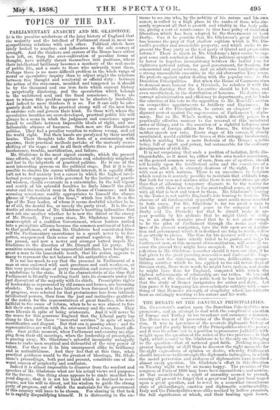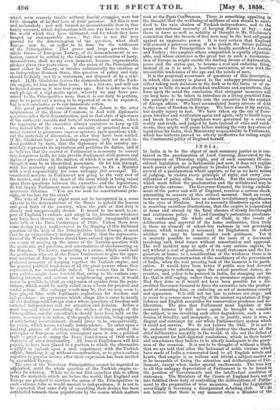THE DEBATE ON THE DANUBIAN PRINCIPALITIES. MR. GeAnsroNE's motion upon
the Danubian Principalities was premature, and an attempt to deal with the complicated question of Europe and Turkey in too trenchant and summary a manner. The House was not in possession of the Report of time Commis- sion. It was in ignorance of the accurate diplomatic history of Europe and the party history of the Principalities since the peace ; and it was therefore not in a position to pronounce judicial!), with weight upon the question of the union of the two province, in that light, which seemed to Mr. Gladstone to be the only one belonging to the question—that of national good faith. Nothing requires greater ingenuity or skill than to discover the right moments for the right expressions of opinion or desire, whereby Parliament should intervene to disentangle the diplomatic imbroglios, in which the moral perversion and rashness of diplomatists have in volved . almost every question. Mr. Gladstone's effort in this direction on Tuesday night was by no means happy. The promises of the congress of Paris of 1856 may have been inconsiderate and unwise. At that council-table a spirit of unreality seemed to prevail, causing all present to forget that a great war had just been waged upon a great question, and to revel in a somewhat tumultuous state of philanthropic emotion and diplomatic sentimentality. Italy and the Principalities were alike mocked by hollow promises, the full significance of which, and their bearing upon issues, which seem scarcely triable without fearful struggles were but little thought of in that hoar of fools' paradise. All this is true and melancholy ; and will furnish no inconsiderable item in that hilAyy account, which diplomatists Will one day have to render to the.. world which they have distracted,- and for which they have heaped up immeasurable ,wees..;"'. But this is not the true ground for the determinatien of the .question, what shall Europe now do, or _finffer_to be done for the settlement of the Principalities. a T,hat grave and large question, the whole future of European, Turkey, of its dismemberment or co- hesion, cannot be settled_ by the collateral consideration of hasty, inconsiderate, shall _we say even immoral, because impracticable pledges given two years. since. , If. the union of the Principalities must either be illusory, or, involve substantially the erection of an independ,ent Rouman State' this question of policy and duty should beafairly met by a statesman, not disposed of by a side- wind.. ,Ifddr. Gladstone desires the dismemberment of the Turk- ish empire, let him raise that issue.- It is a fair one, and will not be howled, down as it was four years ago. But to refer us to the rash-pledge of a diplomatic agent, whereby we may have pro- mised to the Principalities more than it- is our duty to perform, maybe to point out a wrong to be repented of or to be expiated,
i but s not conclusive as to our immediate action.
_The great practical, conclusion from the debate is the utter helplessness of the House of Commons to deal with diplomatic question3 after their determination, and. in that state of ignorance of the authentic records and facts of international action, which the ingenuity of the executive always contrives to keep up till long indeed after the event. An assembly of practical men will never consent to pronounce express opinions upon questions with- out the materials of discussion, or after they have been settled. If Mr. Gladstone have a haunting suspicion, only too much in- deed justified by facts, that the diplomacy of his country un- worthily represents its aspirations and. performs its duties, and if he believes that the control of Parliament is necessary to correct this dangerous fault, let him provide Parliament with powers and rights of prevention in the matter, of which it is not in practical,- though it may be in theoretical possession. Or let him attempt, with his masterly and indignant eloquence, to fix a Minister with a real responsibility for some unhappy fait accompli. III- considered motions in Parliament not going to the very root of the matter, and. the very heart of the issue which is being raised upon these questions between the executive and the legislature, do but impale Parliament more cruelly upon the horns of the Pal- merstonie dilemma. "You are too soon for constitutional prin- ciple, or too late for the event." The vote of Tuesday night must not be interpreted in a sense adverse to the determination of the House to uphold the honour and good faith of the country, when the path of that duty is clearly and unequivocally shown. It would be too much to ex- pect of England to endorse and adopt in its literalness whatever may have been thrown out in the shamefully irresponsible and loose talk of the Paris Conferences of 1856. Unless there were some design as yet undiscovered in the flinging of this firebrand question of the wish of the Principalities before Europe, it must ever be an extraordinary instance of fatuity, that the representa- tives of the Western Powers should. have entered upon the danger- ous course of Ting up the issues of the Eastern question with the accidents, and passions, and uncertainties of electioneering on the Danube. The levity, amounting to a crime, which could. lead the gentlemen who sat at the Peace Conferences to give the appa- rent sanction of Europe to a course at variance alike with the professed necessity of keeping together the Turkish empire, and the general political tendencies of all the great powers whom they represented, was remarkable indeed. The veriest tiro in Euro- pean politics might have foretold that, owing to the various con- flicting interests and actions of neighbouring powers, it would never be possible to elicit an expression of opinion from the popu- lations, which could be safely relied on as a basis for prudent and useful action. The unhappy result may be, that we may seem to have played false with legitimate aspirations for freedom and independence : an appearance which clings like a curse to nearly all our dealings with foreign states where questions of freedom and national independence call for attention and decision. Before a word was said about consulting the wishes of the people of the Principalities, careful consultation should have been held on the course necessary to be taken, if the people's decision, being capable of satisfactory ascertainment, should prove to be, unequivocally, for union, which means virtually independence. To enter upon a doubtful process of electioneering without having settled the principles of European action consequent upon it, was a political fault so great as to stamp the Peace Conferences of 1856 with a character of utter irrationality. All honest Englishmen will feel pained,.to have been placed in a position in which the alternative is either to embark upon: a rash experiment with the Turkish empire,' breaking it up without reconstruction, or to give a callous negative to popular desires after their expression has been invited
by assenabled Europe. - •
The case of the Danubian Principalities cannot be regarded as adjoin;lied; until the whole question of the Turkish empire re- cervealts solution. While we do not find ourselves able to affirm from the materials which are before the world, that England and Europe are pledged to sanction the union of the Principalities in such extreme form as would amount to independence, it is not to be- contested that some duty of consulting their desires has been Coitricted towards those populations by the course which matters took at the Paris Con erences. There is something, appalling in the thought...dee the wellbeing of millions of Men -should be sacri- ficed to the vain shadow of Turkish independence, and to- thi3 great international necessity of keeping ,Russia • it - bay.- And there is force as well as nobility of thought Mr: Gladstoices contention that the breasts of free men may be the best safegnird - against an aggressive power. - It is very certain that England will commit a grievous wrong if she permit the Muse political happiness of the Principalities to be finally sacrifieed,to -Austria and Turkey ; two empires' whose composition is equallfobjeetion- ; able, and whose existence is the great bar to such: a' recOnstrie- ' tion of Europe as might enable the darling dream Of diganiatiSts, ' peace and the status quo, to become a real and. enduring thing, instead of as it is now, a heartless convention at war with the !
irresistible tendencies of the age and the minds of men. '
It is the perpetual recurrence of questionn of this description, in which this country is placed in the unhappy predicament of either taking rash decisions in the dark as to the facts, or of ap- pearing to belie its most cherished traditions and aspirations, that force upon the mind the conchision that-Stringent' measures will - ere long have to be taken to introduce in a living practicarferia the principle of responsibilitY into the executive for the edidnet of foreign affairs: e'have accumulated. heavy arrears of debt - to the cause of freedom in Europe.. We have "done it lip'Serii,Ce, but deadly injury in fact: We have taken up' the- crybf Euro- pean liberties and civilization again and again, only to baulk leines
and break hearts. legislators were 'governed by a sense of reality and truth, and judged by facts instead of cries and catch- ' words, they might well pause before making the very key-stone of legislation for India, that Ministerial responsibility to Parliament, which has hitherto proved so utterly ineffective for ruling aright the Continental policy of England herself. •



























 Previous page
Previous page